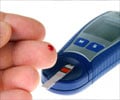- Type 2 diabetes is a serious metabolic disease that is associated with poor COVID-19 outcome
- The study finds that there is a 48% increased risk of severe COVID-19 with long-term blood sugar
- However, the risk might be curbed down with the use of common diabetes-control medication
Read More..
What is Type 2 Diabetes?
Type 2 diabetes is a serious metabolic disease that is characterized by high blood glucose (blood sugar). It occurs when your body does not sufficiently produce or utilize a hormone made by the pancreas called insulin (which allows glucose from food to get into your body cells for energy). The most commonly preferred method to diagnose type 2 diabetes is glycated haemoglobin (A1c – measures average blood sugar level for the past two to three months). The following are the categorized values of HbA1c:- Below 5.7% – Normal
- 5.7% to 6.4% – Prediabetes
- 6.5% or higher – Diabetes
COVID-19 and Diabetes
Diabetes is also associated with poor outcomes in COVID-19. COVID is found to increase the risk of intensive care by nearly 50% among type 2 diabetics who have long-term poor glycemic control as compared to those with better long-term control of their blood sugar levels.The present study “Evaluation and management of COVID-19-related severity in people with type 2 diabetes” analyzed records of ~16,000 type 2 diabetics between 2017 and 2020 with COVID-19 to establish the causal mechanism.
Understand the Mechanism
Poor glycemic control is observed to create a reaction that allows accumulation of molecules – advanced glycation end-products (AGEs). These molecules further deteriorate the quality of bone over time – former investigation of the study team.The team was set to investigate if longitudinal glycemic control measurements were a better predictor of bone fracture risk. This measure was used simultaneously in foreseeing the severity of COVID-19.
As AGEs are known to contribute to amplified oxidant stress and inflammation, these may pose as a risk factor for COVID-19 and other respiratory illnesses as well.
Effects of Poor Glycemic Control
The study participants (with type 2 diabetes) were divided into two groups – those with “adequate” longitudinal glycemic control (6 to 9%) and “poor” glycemic control (9% or above) over two to three years.It was found that there was a 48% more chance of ICU (intensive care unit) treatment among those with poor glycemic control. Every 1% increase in HbA1c (longitudinal) was directly linked to a 12% increase in ICU admission.
Severity of COVID-19
“We find that two- to three-year longitudinal glycemic levels better indicate the risk of COVID-19 severity than measurements which look at a shorter period of time. We hope these insights aid physicians in better treating and managing high-risk patients,” says Deepak Vashishth, corresponding author, professor of biomedical engineering, and director of the Center for Biotechnology and Interdisciplinary Studies at Rensselaer Polytechnic Institute.Moreover, data also suggests that there is a lower risk among patients who use the common diabetes-control medication metformin by 12%, or metformin and insulin combination by 18%, or corticosteroids by 29%.
Duration Matters
“People knew that diabetes was a risk factor for COVID-19-related outcomes, but not all diabetic patients are the same. Some people have a longer history of diabetes, some have more severe diabetes, and that has to be accounted for. What this study does is to better stratify the level of diabetes within the population, so diabetic patients aren’t treated as a single population without any differences among them,” says Wang, who is part of this study at the Icahn School of Medicine, Mount Sinai.The study thereby emphasizes better control of blood sugars to prevent the severity of COVID-19.
Reference:
- Evaluation and management of COVID-19-related severity in people with type 2 diabetes - (https://pubmed.ncbi.nlm.nih.gov/34493495/)
Source-Medindia
















